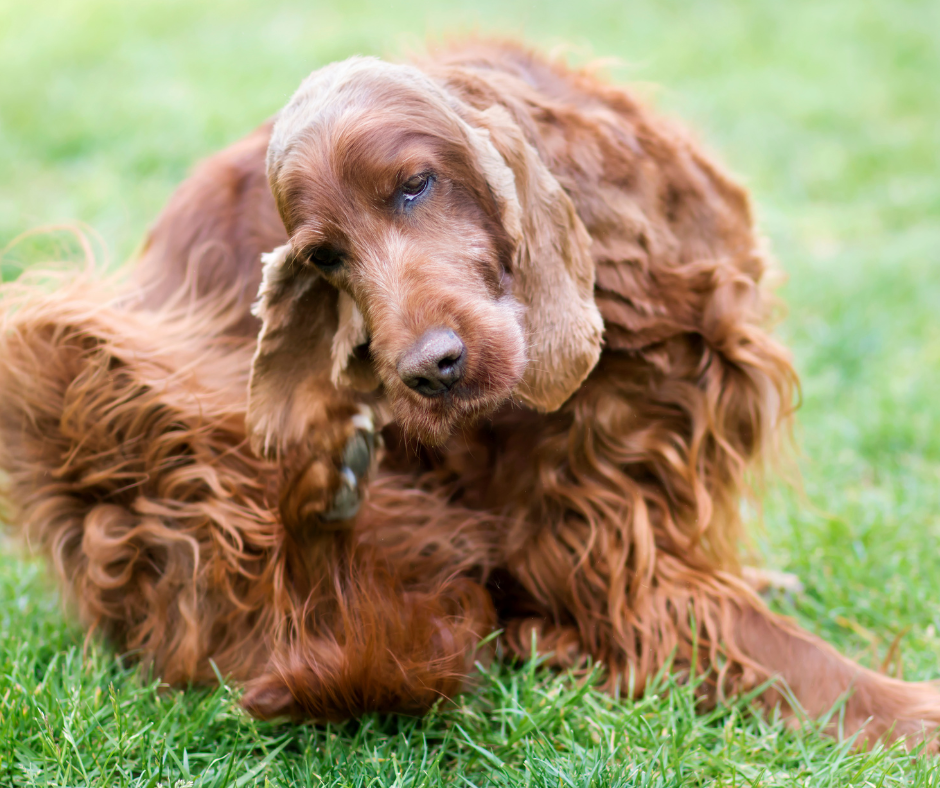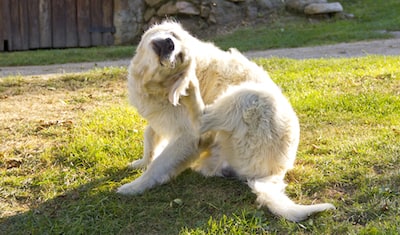At some point in your life, you’ve probably experienced a bout of dryness, flakiness, or itching, but did you know that humans aren’t the only ones who can struggle with dry skin? Beneath their thick fur coats, your dogs have skin that’s not too dissimilar from yours—just like you, they might suffer from the occasional bout of dryness! So, why does your dog have dry or itchy skin? Read on to find out!
Does your dog have dry or itchy skin?
Discovering that your dog is having a problem with dry skin can be as simple as noticing extra scratching or squirming. Keep an eye out for one or more of the following symptoms to clue you in on a potential issue:
- Excessive itching or other signs of discomfort
- Dandruff or flaky skin
- Scales or scabs
- Hair loss
- Skin redness or inflammation
- Unusual skin odour
Tackling the root of the problem
Just as numerous causes are resulting in dry human skin, dogs may also have dry skin for any number of reasons. Because dry skin can be a sign or symptom of another underlying health problem, it’s important to get to the bottom of the dry skin’s origin as soon as you recognise that it’s a concern.
Most commonly, your dog may experience symptoms related to dry skin due to:
1. Harsh weather
Seasonal weather changes (especially the chill and harsh wind of winter) can wreak havoc on your dog’s skin. This is one of the most common causes of dry skin in dogs, which will likely present as areas of flaky skin, moist eczema, or both.
2. Allergies or irritants
Just like humans, a dog’s skin may react negatively to allergens or irritants. For example, evaluate any topical products you are using on your furry friend such as shampoos or medications, as the ingredients within could be causing skin irritation or excessive dryness.
Other environmental allergies (common ones include fleas, pollen, household cleaning products, perfumes, smoke, and dust) may also lead to dry skin. Your dog’s veterinarian can help you narrow down the offending allergy.
3. A poor diet
Low-quality dog foods may not always be full of the necessary vitamins, minerals, and other nutrients your dog needs to maintain healthy skin and a gleaming coat. Over time, deficiencies in these crucial nutrients can lead to dry skin and related problems.
4. Creature concerns
Fleas, mites, and lice are common culprits for dry and irritated canine skin. These tiny creatures’ presence often results in reactionary scratching, licking, and biting which can worsen the problem further.
5. Systemic illness
In some cases, dry skin may be the symptom of an overarching health problem rather than the primary concern itself. For example, dry skin is a frequent symptom of hypothyroidism, when your dog’s thyroid produces less thyroid hormone than is normal. If your dog’s dry skin is accompanied by weight gain or lethargy, let your vet know!
Treating your dog’s dry or itchy skin
Unfortunately, treating dry skin in dogs isn’t quite as easy as grabbing a bottle of lotion and slathering it over the affected area until the problem resolves. However, tackling your dog’s dry skin at home isn’t impossible either! Plenty of over-the-counter and homemade remedies exist to provide your pup with some relief.
1. The oatmeal remedy
Perhaps you’ve seen products that advertise soothing oatmeal ingredients for dry skin. This surprisingly simple remedy that you can find in your kitchen cabinet will work wonders for dogs, too! Believe it or not, the chemical makeup of oatmeal contains several anti-inflammatory compounds capable of stopping dry skin in its tracks.
Try grinding oatmeal into a powder and combining it with water to apply to patches of irritated skin. Oatmeal baths can be equally effective!
2. Edible solutions
Cures for dry and itchy skin don’t always come in the form of topical solutions—introducing more omega oils into your dog’s diet can work wonders as a systemic strategy. For quick solutions, skin and coat conditioners rich in omega fatty acids and Vitamin E can be purchased and given to your dog as a supplement.
Check out Healthy Treats Skin & Coat and VetIQ Skin & Coat, specifically designed to help your dog with itchy skin.
3. Modify bathing routines
Veterinarian Dr Robert Proietto emphasises the importance of keeping bath time with your dog as gentle as possible. In addition to avoiding over-the-counter shampoos and flea treatments that may contain harsh ingredients irritating to sensitive skin, stick with prescription remedies and oatmeal-based shampoos.
Also be mindful of not scrubbing your dog too roughly during bath time, as this can irritate his skin, too!
Remember to consult with a veterinarian if you notice that the dry skin isn’t resolving or if the problem becomes severe (think scabbing, bleeding, or signs of infection from broken skin). Dry skin may seem a simple problem, but even the most common of ailments can become dangerous if left untreated!







